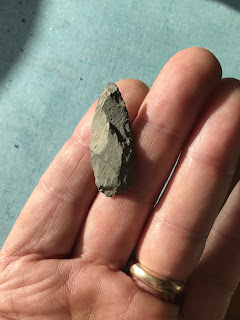I was actually looking for stone tools (see previous post) but found rock piles anyway. I thought this hill would be a good place for early people to be looking out over a glacial lake to the south. Half the hill was some kind of "obsidian" and more on that later. This may be a place with very deep history and no single timeframe in which to interpret everything. I believe the term is "multi-component" - which is a snarky way of saying the archeological categories are meaningful in a place that has seen continuous occupation because of desirable properties. As if the people who lived there either fit into the categories or were 'transitional' between them. It would be simpler just to talk about the place.
[Update: After visiting the hill and doing a lot of examining of the stone tools, I admit that the above is wrong. There can be very distinct phases of people, clearly culturally different from each other. There can be a great depth of time over which "component" differences are quite meaningful. In other words: no, it was not necessarily a continuum of cultures. In that case, teasing apart some of the technology differences can be quite fun.]
As I climbed this hill, I noticed it had a lower 'bump' to the south and a higher 'bump' to the north. At the top of the lower bump I noticed this little 'U' structure [we are facing west]:
Is this an old fireplace (in the worst possible position for being out of the wind) or a prayer seat facing north or a who knows what? [It is faintly possible it is what is left of a small hunter's blind. A game trail passes, a few feet away.]
Continuing up the hill to the higher bump, I noticed this rock pile [we are facing northeast]:
Now don't tell me
that is a fireplace! No, it's a rock pile. I am pretty sure I have seen similar ones on top of other bumps in the southwest. Anyway, the 'U' on the lower bump was not visible from this spot - you could not see the rock pile uphill from the lower 'U'.

























